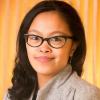Dr Massimo Faggioli is a prominent Catholic historian and theology professor at Villanova University in Philadelphia. He is a prolific writer and editor, whose work can be found in publications like Commonweal, La Croix and America magazine.
As a historian, Massimo views developments in the Catholic Church with a much longer lens. In this episode, he shares insight into the conservative responses to Pope Francis and the papal shift toward a less abstract understanding of being Catholic. He also discusses the way that the two-party political system in the United States has permeated the Catholic Church there.
Finally, he explains why Vatican II is not just unfinished business but an orientation and method for doing things.
Soundcloud | iTunes
 Fatima Measham is a Eureka Street consulting editor. She co-hosts the ChatterSquare podcast, tweets as @foomeister and blogs on Medium.
Fatima Measham is a Eureka Street consulting editor. She co-hosts the ChatterSquare podcast, tweets as @foomeister and blogs on Medium.